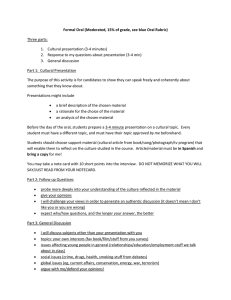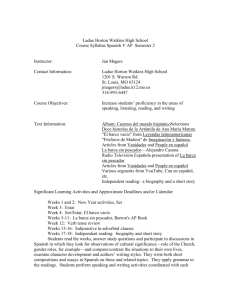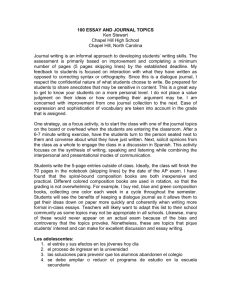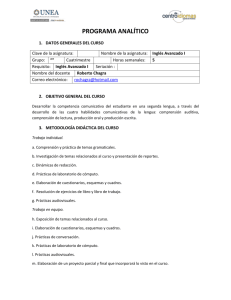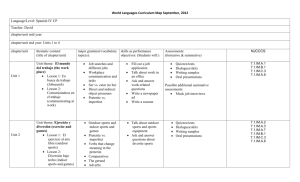PP 3
advertisement
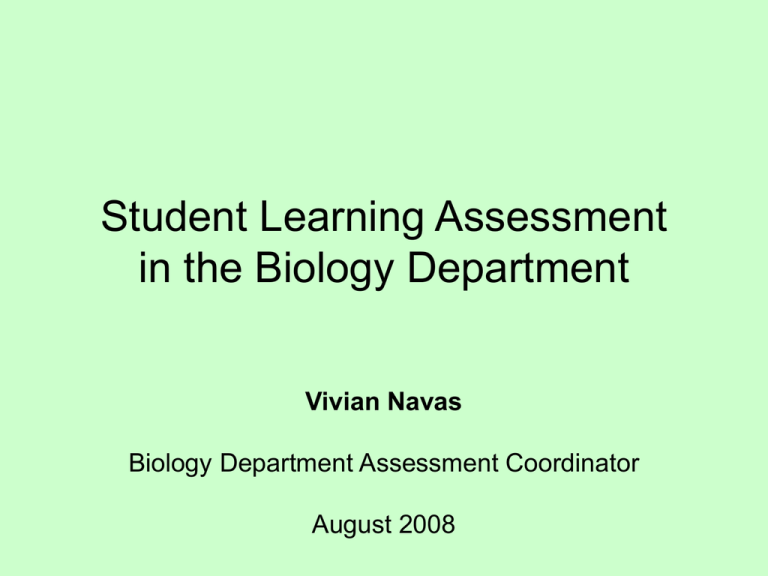
Student Learning Assessment in the Biology Department Vivian Navas Biology Department Assessment Coordinator August 2008 Learning Objective • Increase Student’s Awareness of Contemporary Scientific Issues Department Learning outcomes: • Awareness of contemporary scientific issues • Awareness of ethical implications in science • Also included in the Institutional, College of Arts and Sciences and General Education outcomes Objectives: • Increase students’ knowledge of biology • Encourage students to use a critical and scientific point of view to address important contemporary issues • Make students aware of the ethical implications regarding these issues. • Motivate students to continue learning on these important issues Contemporary Scientific Issues chosen by dept faculty • • • • • • • • • • • Human Genome Project Genomics Genetic engineering Cloning Transgenic organisms Stem cells Bioremediation Global warming Coral bleaching Invasive organisms Ethics in science Student Perception Instrument Science Issue How much do you know about this Issue? Hum Gen Proj 1. 2. Genomics 3. 4. Gen eng • . Cloning Transg orgs 5. Where did you learn about this issue? 1. Courses (please specify course name) Never heard about it 2. Research Heard about it but do not 3. Other (newspaper, magazine, TV, remember much about it. Internet, etc.) Have basic knowledge Have knowledge of applications and ethical implications. Have hands on experience M Perception Results Senior Students How much do you know about this Issue? – Average 3.05- Have basic knowledge 1. 2. 3. 4. 5. Never heard about it Heard about it but do not remember much about it. Have basic knowledge Have knowledge of applications and ethical implications. Have hands on experience Where did you learn about this issue? 1.Required courses (General Biology and Genetics) 2.Other courses (Human genetics, Biochemistry, Microbial physiology, microbiol, medical ethics, cell physiology, botany, inmunology, ecology) 3.Other sources (research, newspaper, magazine, TV, Internet, etc.) Conclusions and actions • These important issues should be included in the curriculum in required courses so all students are impacted • Begin assessing the Global Warming Issue (Cycle 3)Join Campus Initiative • Choose the General Biology Course Cycle 3 • • • • Criteria to be assessed- Global Warming Course: General Biology II Population- Students 150~250 students Pre activity – – freshmen perception and a content pre-test • Interventions – Course- lecture, movie, trailers, information on web ct • Post activity– Content Post-test • Actions: Re-teach concepts – Second post-test Freshmen Perception- How much do you know about this Issue? 5.0 219 freshmen students Average (5 point scale) 4.0 3.4 2.9 3.0 2.5 2.3 2.1 2.1 1.9 2.0 1.8 1.6 1.6 1.5 1.0 HG P ics m o en G . gi n .E en G Cl i on ng T n ra s .O rg . s em t S lls ce . ia ed em or i B . rn a w al b lo G Co l ra b ac le h. e siv a v In g. or cs hi t E How much do you know about this Issue? Results All 11 issues - Average 2.15 Global Warming- 3.4 1. 2. 3. 4. 5. Never heard about it Heard about it but do not remember much about it. Have basic knowledge Have knowledge of applications and ethical implications. Have hands on experience Where did you learn about this issue? Comparacion clase y otros 100% 24 80% 34 41 42 44 49 52 57 36 53 50 60% 2 40% 56 56 53 51 44 45 20% 34 32 28 30 21 1 0% HGP Genomics Gen. Engi. Cloning Trans. Org. Stems cells Bioremedia. Global warn. Coral bleach. Invasive org. Ethics Where did you learn about this issue? 1. Courses 2. Others (Research, newspaper, magazine, TV, Internet, etc.1 and 2 ,1 and 3,2 and 3,1, 2,3) Pre and Post test- True or false • • • • • 1.El calentamiento global afecta mayormente a ciudades tecnológicamente avanzadas. F 2. Los gases de invernadero, como el vapor de agua, CO2 y metano, causan calentamiento global y, por lo tanto, deben ser eliminados por completo.F 3. Los bosques alivian el calentamiento global porque liberan grandes cantidades de CO2 a la atmósfera.F 4. La sobrepoblación contribuye al calentamiento global.C 5. Las plantas de carbón son una buena alternativa ante la crisis de combustible fósil F • 6. Los Estados Unidos han sido pioneros implementando soluciones para frenar el calentamiento global. F • 7.Todo proceso que utiliza petróleo (o sus derivados, incluyendo la gasolina) contribuye al calentamiento global. C • 8.El calentamiento global causa tanto inundaciones como sequías. C • 9. La deforestación es una de las causas del calentamiento global C • 10.La solución al calentamiento global está principalmente en manos de los grandes empresarios que operan industrias altamente contaminantes. F Global Warming Interventions • National initiative- In class discussion • Movie assignment: An inconvenient truth • WEBCT MODULE in General Biology II- created by Dr. Carlos Munoz – Movie trailers – Information on recycling initiatives at RUM – What we can do to help? – Other related information – Pretest and Posttest Results Question # 1 2 3 4 5 6 7 8 9 10 Pre test N=296 72% 80% 74% 89% 64% 70% 94% 93% 95% 54% Results Pre-test • Many students had much knowledge: – on things that cause global warming such as overpopulation, deforestation, petroleum companies. • Most failed questions: They incorrectly thought: – that coil based energy production was good for the environment, – that big industries are mostly responsible for solving the problem – that the US is way ahead in global warming prevention. Pre test 296 Average 72.4% Post test 324 60.2% • Did not take seriously • Did not see movie • Did not understand movie Actions • Retaught global warming main concepts • Offer a second post-test • Shared missed questions and misconceptions with faculty for them to be aware and further discuss with students • Some Included questions in final exam • Look into implementing a different intervention Post test New Questions • • • • • En realidad, la cantidad de bióxido de carbono en la atmósfera de la Tierra exhibe fluctuaciones anuales cíclicas; cada año la concentración sube durante nuestro invierno y en verano vuelve a bajar. De acuerdo al documental "An Inconvenient Truth", se estima que el aumento en temperatura en los polos será mayor que en el ecuador del planeta. De acuerdo al documental "An Inconvenient Truth", la protección del medioambiente inevitablemente implica sacrificios económicos. De acuerdo al documental "An Inconvenient Truth", casi el 90% de los artículos sobre calentamiento global publicados en revistas arbitradas ("peer reviewed") coincide en que este problema es resultado de las actividades humanas y que es un problema serio. De acuerdo al documental "An Inconvenient Truth", más de la mitad de los artículos acerca de calentamiento global en la prensa popular (periódicos, revistas populares, etc.) expresa incertidumbre en cuanto a si el calentamiento global está ocurriendo o no. Pre test N=296 Post test N=324 Average 72.4% 60.2% Post-Post N=169 Faculty 1 Post-Post N=142 Faculty 2 87.4% 82.8% Innovations Webct module • Site contains: – contemporary issues information Advantages • Allow for easy assessment of student knowledge through pre and posttest • Allow for easy grading of instruments • Allow for students to share the information with their families and friends • Allow for implementation in other courses and throughout other semesters • Allow for adding other contemporary issues information • http://webct.uprm.edu:8900/SCRIPT/BIOL 0000_Munoz/scripts/serve_home Global Warming initiatives in other courses • Faculty: – – – – – – – Kolterman (botany), Alfaro Massol (seminar), Fernando Bird (evolution) Ana Velez (gen biol), Carlos Rios (microb physiol), Williams (parasit) • Interventions : trailers, lectures, movie • Post- exam question, reflections Future Assessment Studies Cycle 4 • Continue to discuss other contemporary issues – Pre and post and interventions in webct • Assessment of skills and knowledge gained through undergraduate research on up-to-date scientific fields (HHMI)

